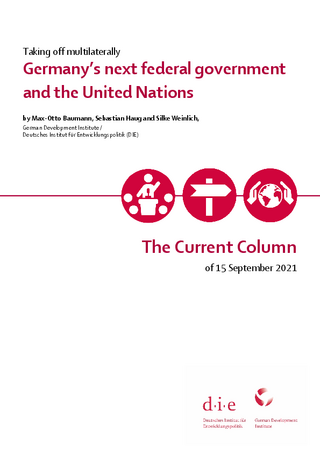Taking off multilaterally
Germany’s next federal government and the United Nations
Baumann, Max-Otto / Sebastian Haug / Silke WeinlichThe Current Column (2021)
Bonn: German Development Institute / Deutsches Institut für Entwicklungspolitik (DIE), The Current Column of 15 September 2021
This week, the Secretary-General of the United Nations (UN) Antonio Guterres presented “Our Common Agenda”. According to this ambitious repositioning plan, the UN is to address urgent global problems much more forcefully and advocate for a new social contract based on respect for human rights. Germany’s next federal government should take this proposal – aimed at launching a new phase of global common good promotion after the UN’s 75th anniversary – as an opportunity to increase the strategic value and coherence of German UN policy. It should invest in ideas and alliances that allow Germany to effectively use the UN in addressing global challenges and make the organisation fit for the future.
Germany is in a good position to take off multilaterally, notably because German engagement with the UN has expanded extensively in recent years. In 2016, Germany became the second largest contributor to the UN. This also applies to the financially most relevant areas of UN work, development cooperation and humanitarian aid. For individual entities such as the UN Development Programme (UNDP) or the World Health Organisation (WHO), Germany is currently the most important donor. Unlike other countries that cut their contributions during the COVID-19 pandemic, Germany significantly increased its assistance and has thus contributed to a more effective multilateral crisis response. Germany’s contributions to WHO almost tripled during the pandemic. Other development organisations such as the UN Children's Fund (UNICEF) have received an increase in particularly valuable core funds that are not tied to donor requirements and can thus be used flexibly by UN organisations.
Financial commitment, however, is not the only reason why Germany is a valued partner for the UN. With the Alliance for Multilateralism, an association of like-minded states that advocate for a rules-based international order, the German government has offered an alternative approach to the unilateralism of the USA under Donald Trump. Observers also highlight German participation in seven of the current 13 UN peace missions and, overall, draw a positive balance of Germany’s 2019/2020 Security Council Presidency, despite adverse geopolitical circumstances. Germany's explicit Security Council statements on human rights violations by Russia or China have contributed to this perception. The fact that two high-ranking leadership positions will soon be held by Germans – with Achim Steiner leading UNDP and Gerd Müller about to take over at the UN Industrial Development Organization (UNIDO) – reflects the extent to which Germany is highly regarded at the UN. In addition, Germany itself has become an important UN base. Bonn alone is now home to 25 UN entities, and the WHO Hub for Pandemic and Epidemic Intelligence was recently inaugurated in Berlin.
In sum, this has resulted in a considerable and visible German commitment to the UN. At the same time, Germany’s new role and the ensuing space for action have not yet sufficiently penetrated political consciousness across government and society. So far, the expansion of German engagement at the UN has not followed an overarching strategy. Instead, largely uncoordinated internal decisions have led to Germany almost inadvertently rising to the position of a heavyweight actor. In view of central challenges that (in)directly affect Germany, however, – from accelerating climate change to setbacks in human development and global regulatory gaps – it is more important than ever to shape international policy strategically. With the expanding clout of geopolitical great power rivalries, there is a need for a proactive German UN strategy that, in coordination with the European Union and other like-minded states, contributes to shaping global politics in line with the “Common Agenda” put forward by Guterres.
Germany’s next federal government should ensure that intended contributions for UN organisations and processes are stably anchored in the federal budget. Above all, German UN policy needs higher levels of strategic capacity and more coherence across ministries and implementing agencies. In modernising the foreign policy apparatus after the failure of the intervention in Afghanistan, for instance, the 2030 Agenda must become a central reference point. More generally, German UN policy should be guided by inter-ministerial principles rather than small-scale one-off considerations. Overall, the next German government should work towards strengthening the UN in order to make it fit for addressing global challenges. This includes giving countries of the global South and non-state actors a more effective voice and upgrading UN organisations politically and financially by increasing core contributions.
This text has been published as part of the series “Impulses for the Bundestag election”.




